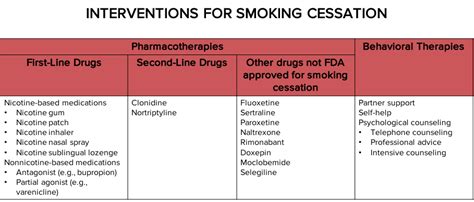Intro
Discover effective medicine to quit smoking, including prescription medications and nicotine replacement therapy, to help overcome nicotine addiction and quit smoking for good.
Quitting smoking is one of the most challenging tasks a person can undertake, but with the right mindset and support, it is achievable. The importance of quitting smoking cannot be overstated, as it is a leading cause of preventable deaths worldwide. Smoking is responsible for a multitude of health problems, including heart disease, stroke, and various types of cancer. Furthermore, smoking affects not only the individual but also those around them, exposing loved ones to secondhand smoke. The benefits of quitting smoking are numerous, ranging from improved health and increased energy levels to enhanced cognitive function and a reduced risk of smoking-related illnesses.
The journey to quitting smoking is often daunting, but there are various strategies and tools available to help individuals overcome their addiction. One of the most effective methods is through the use of medicine specifically designed to aid in smoking cessation. These medications work by reducing cravings and the pleasurable effects of smoking, making it easier for individuals to quit. Understanding how these medicines work and the different options available is crucial for those seeking to quit smoking. Moreover, combining medication with behavioral support, such as counseling and support groups, can significantly increase the chances of success.
The decision to quit smoking is a significant step towards a healthier lifestyle, and it's essential to be informed about the resources available. From nicotine replacement therapy to prescription medications, there are several approaches to consider. Each method has its advantages and potential side effects, and what works for one person may not work for another. Therefore, it's crucial to consult with a healthcare provider to determine the best course of action. With the right combination of medication, support, and determination, quitting smoking is not only possible but also a vital step towards improving overall health and wellbeing.
Understanding Smoking Addiction

The Role of Nicotine in Smoking Addiction
Nicotine's role in smoking addiction cannot be overstated. It is the primary substance that leads to physical dependence, making quitting smoking challenging. Nicotine replacement therapy (NRT) is one of the most common methods used to help individuals quit smoking. NRT works by delivering nicotine to the body in controlled amounts, reducing withdrawal symptoms and cravings. This approach allows individuals to gradually decrease their nicotine intake, eventually stopping altogether. NRT comes in various forms, including patches, gum, lozenges, inhalers, and nasal sprays, offering flexibility and choice for those trying to quit.Medications to Aid in Smoking Cessation

Benefits and Side Effects of Smoking Cessation Medications
While medications can significantly aid in quitting smoking, it's essential to be aware of their potential benefits and side effects. NRT, for example, can cause skin irritation (from patches), jaw pain (from gum), and throat irritation (from lozenges or inhalers). Prescription medications like bupropion and varenicline can have more severe side effects, including insomnia, dry mouth, and nausea. However, for most people, the benefits of these medications far outweigh the risks, especially when considering the health risks associated with continued smoking. It's crucial to discuss these aspects with a healthcare provider to make an informed decision about which medication to use.Behavioral Support and Counseling

Strategies for Maintaining Smoking Cessation
Maintaining smoking cessation requires ongoing effort and commitment. Strategies such as avoiding triggers, staying active, and managing stress can help prevent relapse. Setting realistic goals and celebrating milestones are also crucial for maintaining motivation. Furthermore, staying connected with support groups and healthcare providers can provide the necessary encouragement and guidance throughout the quit journey. It's also important to remember that quitting smoking is a process, and it's not uncommon for individuals to experience setbacks. However, with the right mindset and support, these setbacks can be overcome, and long-term smoking cessation can be achieved.Alternative Methods for Quitting Smoking

Evaluation of Alternative Quit Smoking Methods
It's essential to approach alternative quit smoking methods with a critical and open-minded perspective. While some individuals report success with these methods, the scientific evidence supporting their effectiveness is often limited. It's also important to ensure that any alternative method used is safe and does not interfere with other health conditions or medications. Consulting with a healthcare provider before starting any alternative quit smoking method is advisable to discuss potential benefits and risks.Conclusion and Future Directions

Final Thoughts on Smoking Cessation
In the end, quitting smoking is one of the most rewarding decisions an individual can make, leading to improved health, increased energy, and a reduced risk of smoking-related illnesses. It's a journey that requires patience, perseverance, and the right support. Whether through medication, counseling, or alternative methods, there are numerous resources available to help individuals overcome their addiction to nicotine. As we look to the future, it's essential to continue promoting smoking cessation efforts, supporting research into new treatments, and encouraging individuals to take the first step towards a smoke-free life.What are the most effective methods for quitting smoking?
+The most effective methods for quitting smoking often involve a combination of medication and behavioral support. Nicotine replacement therapy (NRT) and prescription medications like bupropion and varenicline can significantly aid in quitting, especially when combined with counseling and support groups.
How long does it take to quit smoking?
+The time it takes to quit smoking varies from person to person. Some people may quit successfully after a few attempts, while others may take several tries. Generally, the first few weeks are the most challenging, with withdrawal symptoms and cravings being the most intense. However, with the right support and strategies, most people can overcome these challenges and achieve long-term smoking cessation.
What are the health benefits of quitting smoking?
+The health benefits of quitting smoking are numerous and significant. Within 20 minutes of quitting, heart rate and blood pressure decrease. Within 12 hours, carbon monoxide levels in the blood decrease. Over time, the risk of heart disease, stroke, and various types of cancer decreases, and lung function improves. Quitting smoking also improves breathing, boosts energy, and enhances overall health and wellbeing.
We hope this comprehensive guide to quitting smoking has provided you with the information and inspiration you need to start your journey towards a smoke-free life. Remember, quitting smoking is a process, and it's okay to take it one step at a time. Don't hesitate to reach out to healthcare professionals, support groups, and loved ones for help along the way. Share your experiences, ask questions, and support others who are on the same path. Together, we can overcome the challenges of nicotine addiction and achieve a healthier, smoke-free future.
